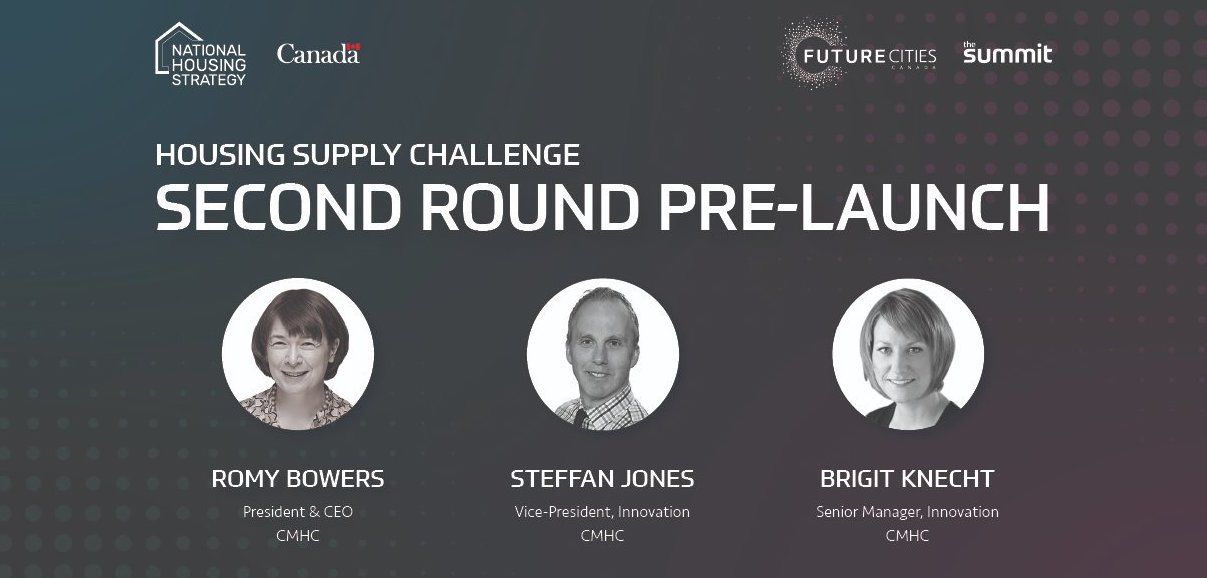Story
May 25, 2021
Five Insights from the Pre-Launch of the Second Round of the Housing Supply Challenge

By Evergreen
Experts from CMHC discuss the second round, Getting Started: Pre-development Processes
At Future Cities Canada: The Summit on May 19, 2021, we heard from CMHC’s new President and CEO Romy Bowers, VP of Innovation Steffan Jones, and Senior Manager of Innovation Brigit Knecht as they discussed the Housing Supply Challenge and its second round, Getting Started: Pre-development Processes. The Housing Supply Challenge aims to remove or reduce barriers that hinder housing supply. Up to $300 million in funding will be awarded to innovative solutions over the next five years. The Pre-Development Round invites communtiy members from across Canada to submit locally relevant solutions that improve pre-development of housing that is affordable in their own communities.
Want to learn more? Thinking about applying? Here are five key points we took away from that conversation.
The pandemic has further highlighted inequities in the housing sector
The events of the last year have emphasized the need for safe housing. “Our homes have become our sanctuary,” says Bowers. “It’s the place where we work, shop, study, everything else.” But the pandemic has not affected everyone equally, and following stay-at-home orders just aren’t possible for those who don’t have a safe home to go to.
“The pandemic has adversely affected vulnerable populations, particularly racialized communities,” says Jones. “There’s a renewed commitment to create cities where everyone feels a sense of belonging and a chance to thrive.” Addressing systemic racism and reconciliation are essential priorities when breaking down barriers to housing.
Barriers are not uniform across the country
Rural and urban, prairie and coastal, small towns and large: barriers to affordability present differently in different parts of the country, and housing solutions must reflect that. A solution that works in one community may not be applicable in another.
“One of the beauties of a challenge program is it throws the doors wide open for people to identify how these barriers manifest in their local communities and how they can solve them,” says Knecht. Different perspectives are necessary, and partnerships are encouraged, which leads to the next key insight.
Collaboration is key to solving the Housing Supply Challenge
“There’s no one organization that can fix the systemic challenges that exist in the housing system,” says Bowers, but she’s optimistic about solutions that can be implemented by different organizations working together to create long-lasting change.
“One of the key objectives of the Housing Supply Challenge is to foster partnerships,” says Knecht. “This includes applicants working together to solve problems, but we also mean really conscientious engagement with the communities. Make sure you’re talking to the people, and show us how that is reflected in the solution you’re bringing forward.”
Inspiration can be found in imagining a better future
The panelists were asked to envision their ideal future in which all pre-development barriers were removed or solved. For Bowers, that took the form of “quicker approvals, simpler processes, and timely responses to targeted needs in communities.” She looked to the City of Calgary, which recently streamlined a 60-day approval process, as inspiration.
Knecht envisioned a world in which younger generations weren’t burdened by the anxiety of housing affordability within their life time. “It would be nice if some of those anxieties were lessened in society and we were able to focus on other bigger social questions,” she says.
Jones hopes that Round 2 of the Housing Supply Challenge will be a step towards “leveling the playing field a bit between large developers with established relationships, and smaller developers and nonprofits whose hearts are in the right place but who don’t necessarily have the capacity or financial wherewithal to compete.” He imagines a future in which everybody gets a seat at the table.
Support to advance your housing solution is available
Interested applicants from all sectors across Canada are encouraged to apply. This includes nonprofits, private sector, planners, builders, architects, engineers, Indigenous organizations and groups, universities and colleges, provincial, territorial, municipal and regional governments, or a partnership of any of the above. Applications for the Getting Started Round open on June 9th.
CMHC has partnered with Evergreen to offer potential applicants support throughout the Housing Supply Challenge, including guidance, resources, workshops, expert panel sessions and one-on-one mentorship. Learn more about the Housing Supply Challenge Support Program. For questions, please contact HSC-DOLsupport2@evergreen.ca or (647) 670-2265. View the full conversation from The Summit.